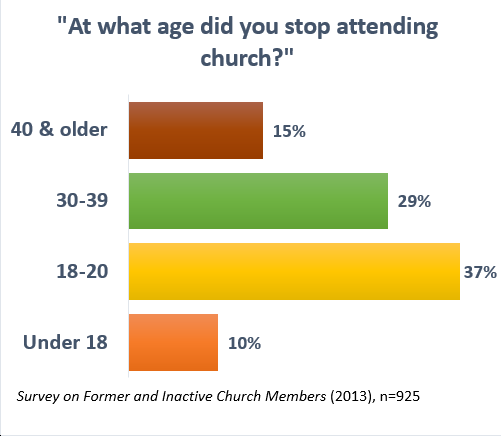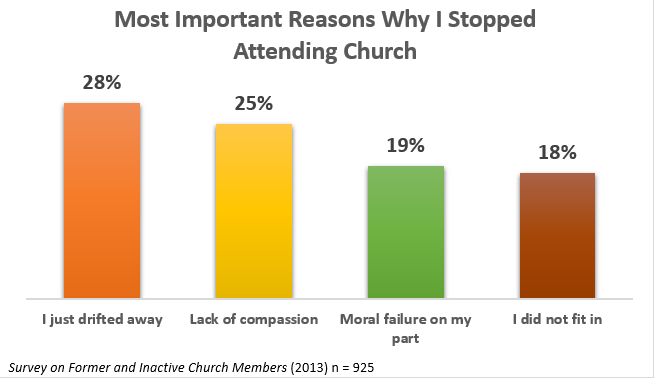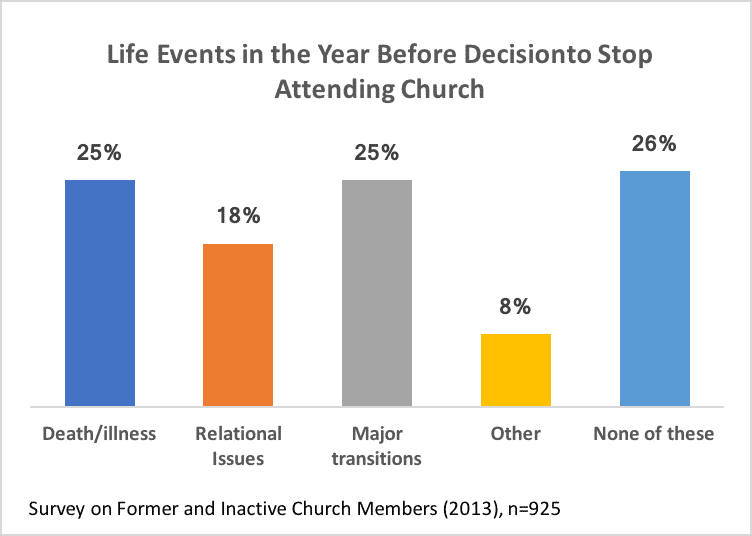In our last blog, we spoke about a study that examined Seventh-day Adventist young people across the United States to find ways we might encourage them to stay in the church. This time we will look at a survey that examines former or inactive Adventists around the world who have stopped attending their local church or became nominal members. We have touched on this subject before in this blog, and noted that some church members are slowly trickling out of churches around the world. Today we want to understand the reasons why church members, young and old, stop attending church.
In order to understand this problem a little better, the General Conference (GC) commissioned the Survey on Former and Inactive Church Members (F&IM) a global study that aimed to give church leaders more insight on the reasons why people leave church. This qualitative study was surpervised by the GC Office of Archives, Statistics, and Research (ASTR) and conducted in 2012-2013 by a team of external researchers led by Paul Richardson. They interviewed people who, whether or not they had been dropped from church records, had ended regular participation in their local Seventh-day Adventist church. What did we learn about the people who stop coming to church? The data from this survey showed us that about half (47%) of the inactive church members stopped attending church sometime before their 29th birthday.

Overall, the percentage of members that have stopped attending church before they were thirty (47%) and those that stopped after thirty (44%) is very close, but because of their distinctive places in life and life experiences, we have to assume that the reasons that these two groups of people stop coming to church have to be different. Indeed, the authors of F&IM suggest that the half of the church dropouts below the age of thirty “could be understood to have lost contact because of the transitions that characterize this age group” while those above thirty probably left as their “thinking, relationships and spiritual needs matured.”
When asked to select the most important reasons why they stopped attending church, the survey participants chose “No big issue; I just drifted away” as the most popular response (28%).
The next largest group of people said they left church because they saw a lack of compassion for the hurting (25%).The next widely cited reason was “moral failure on my part” (19%) followed by “I did not fit in” at 18%.

The authors of F&IM note that it makes sense that 25% of people cited “lack of compassion in their response, as it consistent with research in the United States which suggests that a combination of stressful events in their life coupled by their congregation’s “failure to respond with the…needed support” is a key dynamic that discourages people from attending church.
As we saw in previous blogs, it is very important for congregations to provide a warm and nurturing atmosphere for relationships in their church to thrive and to create strong support networks. Moreover, church leaders could be paying closer attention to the kinds of things their members are experiencing, and make sure they respond with the appropriate, practical support.
With this goal in mind, its useful to know what specific of life events or experiences people went through shortly before they decided to stop attending church. When asked what happened in the year leading up to the time they quit attending church, three out of five members interviewed (74%) reported at least one stressful life event.

As you can see in the graph above, 26% of respondents did not list the event specifically as it wasn’t in the given list, and 8% gave other reasons. There were 15% of respondents who experienced a serious illness, and 10% who had a death in their family. Marital conflict followed closesly at 8%, and marriage/divorce as a separate category was slightly higher at 10%. People also cited major life transitions such as moving to a new town (11%), job change (7%) and graduation (7%) as major events that took place the year before they stopped attending church. Evidently, life transitions and personal/interpersonal crises—while they may not explicitely be triggers—are a vulnerable time for our church members.
It is important to keep in mind the 25% of respondents who, earlier in the survey, claimed they found their local church lacked compassion for the hurting. According to the F&IM report, these answers coincide with a pattern found in research done across North America that demonstrates how stressful life events destabilize a person’s relationship with the church. Then, failing to receive adequate support from their congregation, the church member drifts away. (To see our blog on another retention study and things that trigger their decision to leave click here.
Although seeking out church members who have stopped attending church is crucial in retaining our members, we need to focus on more preventive measures to make sure that there are practical support systems in place across our local churches, worldwide, for those who are sick, grieving, struggling, or simply in need of a friend.
To read more about this survey and presentations on Nurture and Retention, click here.
Creado en colaboración con el Instituto del Ministerio de la Iglesia (Institute of Church Ministry).
Published by ASTR

